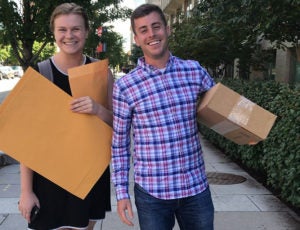Clinic Course for Students Enrolling in the 2023-24 Academic Year
Beginning in the Fall Semester of 2023, sixteen students will join the Appellate Litigation Program. This group of students will brief and argue cases before federal courts of appeals and may work on briefs before the Board of Immigration Appeals and on petitions for certiorari or amicus briefs before the Supreme Court of the United States. Students will work under the supervision of Professor Erica J. Hashimoto and two highly qualified supervising attorneys, both of whom will be earning graduate degrees in advocacy.
Briefing and arguing appeals requires intensive training in all aspects of appellate practice, including procedure, research, issue formulation, and writing. The training emphasizes improving analytical skills and clarity in both writing and oral advocacy. In general, each student, in conjunction with one of the clinic attorneys, will produce two major documents for filing (e.g., briefs or petitions for writs of certiorari). A small number of clinic students will appear before appellate courts for oral argument, and all students will receive training in oral advocacy during the year. Whenever possible, students interact directly with clients through phone calls, letters, and visits if possible.
The caseload of the clinic is generally composed of civil rights, immigration, habeas corpus, and a variety of other civil cases. A Lexis or Westlaw database search will yield a representative sample of the types of cases that we undertake. Although the breakdown varies from year to year, these cases, regardless of type, often raise important constitutional and statutory questions. In the past, the clinic has argued several cases on the merits in the United States Supreme Court.
OUR COMMITMENT
Professor Hashimoto is an experienced appellate lawyer who has spent over ten years training law students to file high-quality briefs in federal courts of appeals and argue cases before those courts. The two advocacy fellows are lawyers selected on the basis of outstanding academic records, excellent writing skills, clerkship experience, and prior appellate litigation experience. They work closely with students in developing their written and oral advocacy skills.
The staff is committed to teaching the finest appellate advocacy. Students learn to analyze a set of facts, develop legal issues, and produce superb written briefs under the supervision of experienced lawyers. Supervision is often in a 2- or 3-to-1 student/attorney ratio. Using moot court techniques, we teach each student the art of oral advocacy.
The clinic’s docket of cases from federal circuit courts of appeals and other courts gives students first-hand experience with the operation of a small appellate law firm and the administration of justice in the federal courts.
YOUR COMMITMENT
A fourteen-credit, year-long clinical program is a significant commitment. It offers students more than just exposure to a branch of law; it is an opportunity to be a lawyer and to work in a partnership under the guidance of experienced lawyers. Students joining the clinic will be required to put in substantial work, including writing and editing briefs, preparing for oral argument, and attending the two-hour weekly seminar. Evening division students who can: (1) attend the scheduled Wednesday afternoon seminar; (2) attend at least two Supreme Court Institute moot courts; and (3) have sufficient work flexibility to take leave time as needed, particularly the week before a major assignment is due, are encouraged to apply.

Under the supervision of one or more of the attorneys, you will work in a team or alone on at least two written projects during the year. You will receive significant feedback initially from the supervising attorney(s) and then from other clinic members and readers with expertise in the area. Your goal will be to produce written and oral products that meet the highest professional standards.
The weekly seminar emphasizes student participation and covers a broad spectrum of issues confronting appellate litigators, such as brief writing, the nuances of oral argument, appellate jurisdiction and procedure, standards of review, and the meaning of professional responsibility in the appellate context. Case assignments generally are completed by the end of classes in April, although some work during exams may be necessary. In that event, steps are taken to ensure that students have adequate time to complete these assignments and prepare for their exams. Students are also cautioned that work on cases may be necessary during holidays or breaks. We attempt to work around exam and break schedules, but this is not always possible.
Students are also expected to attend at least two Supreme Court Institute moot courts during the year. These moot courts provide an excellent opportunity to watch lawyers working on the preparation for oral argument before the highest court in the land and then have the opportunity to see how well the lawyers were able to anticipate the questions posed at the actual argument. Students meet with one of the supervising attorneys after the moot court, and the real argument have taken place to discuss the experience.
Overall, you can anticipate a time commitment of roughly 25 hours per week. That number indicates how the total number of hours worked would average out at the end of the school year. The time actually devoted to the clinic will be concentrated around the time of writing assignments and oral arguments. When briefs are due, substantially more than 25 hours per week should be expected.
Fewer than 25 hours is the norm when briefs are not due. It is relatively easy to plan around these assignments because you will know about them well in advance.
The clinic will conduct a two-day orientation session before classes begin in the Fall.